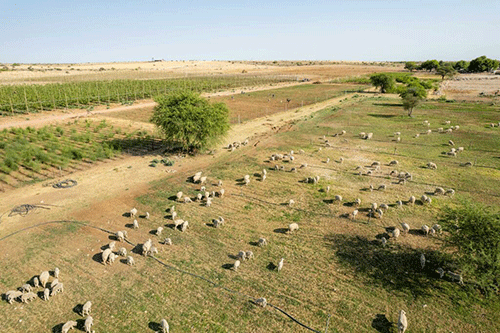Agriculture could be the answer to shifting economic patterns, which requires countries to continually strive to do more with less. For a country that still imports roughly 80% of its food, which accounts for more than N$32 billion, Namibia could benefit from a more stern focus on agriculture.
This is the view of Johan Riekert of Roots Agriculture Village during the recent Women in Agriculture Summit in Windhoek.
He made the remarks as part of his address during the one-day summit, highlighting the need for the country to shift its national development focus to agriculture.
Riekert said Namibia needs to make good use of its natural resources, which supports the development of agriculture in all its forms.
“With resources, I specifically refer to sun, soil and water to which all of us have access. If Israel can be hugely successful in agriculture in an arid environment, so much more can we in Namibia with abundant water resources,” he observed.
For this to be achieved, Namibia needs to create agricultural manufacturing and value- addition to primary agricultural products, and have sound information technology programmes and systems in place.
Other means of achieving this include funding for the installation of infrastructure in primary agriculture, and the creation of markets and off-take agreements for farmers’ produce.
“We need all these conditions to work in harmony to find success in agri-business in Namibia. Let’s focus for a second on the respective roles of government and the private sector.
“Government, in my opinion, is doing a great job to provide us with a safe and secure country, with developed infrastructure and a robust legal system to provide a healthy environment and solid foundation for any entrepreneur to successfully manage a business in Namibia,” he added.
Riekert said the private sector, on the other hand, is not doing its part and taking responsibility to bring about change in the economy. For the private sector to succeed, these basic fundamentals must first be in place, he stated.
Future trends
Commenting on the future trends of agriculture, Riekert said there is a need to entice the youth into believing and appreciating that agriculture can be successful and profitable when done right. The youth need to be educated that the sector can also contribute towards meaningful job and wealth- creation.
“In your endeavour to improve knowledge and skills, it will now, more than ever, become critical to build more agricultural schools. Similarly, agriculture must be a subject in all schools so that our children and future farmers can be exposed to all the possible careers that are available at a young age.
“This is where you children should learn and cultivate a love for farming and already understand their future involvement in agriculture, whether it be the cultivation of crops or raising of livestock,” he said.
Confront
Riekert noted that farmers must stop criticising the government and start taking ownership of the economy through agricultural development.
“My serious concern is that we are living in a very selfish and materialistic social construct, where Namibians are primarily concerned and occupied with building and improving their own wealth and improved balance-sheets at the cost of a unified vision for improving the everyday lives of marginalised and poor Namibian communities, most of whom are struggling on a daily basis building to survive and make a living,” he continued.
Her said farmers thus need to focus on a vision for Namibia where poverty has been eradicated and where “our own interest is aligned with the best interest of the country, instead of the enrichment and empowerment of the few”.
Riekert felt “another challenge we currently face in Namibia is that farmers get land for free without sufficient knowledge and experience to farm, without effective transport for their produce, without cold- chain infrastructure, and no guarantee of off-take agreements”.
While the world population is expected to double in the next 20 years, Namibia has the potential to feed the world if it uses its resources wisely and effectively. With a solid off-take agreement, it is possible to raise funding, and with funding agricultural towns can be build, he added.
Empowering women agri-preneurs
The ‘Women in Agriculture Summit’ was held by Heiress Communications, in collaboration with Energy 100, at the National Theatre of Namibia on Thursday, 22 September.
Using the theme ‘Tackling Global Food Insecurity and Women’s Role in Feeding the World’, the event is expected to interrogate the potential of women farmers to have a net-positive impact on the economy through agriculture.
The event provided a platform for women in business, particularly those interested in agri-business, to identify relevant organisations and their roles in the marketplace, and serve as a roadmap into agri-business for any budding agripreneurs. –tjatindi@gmail.com


